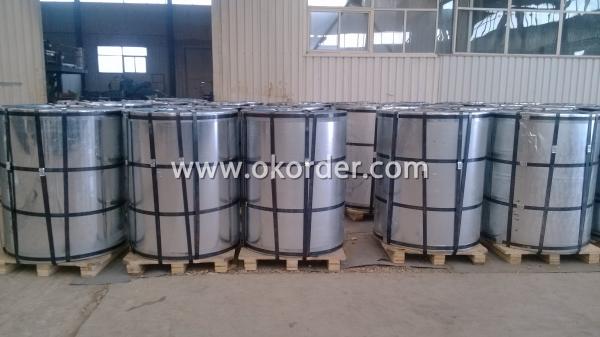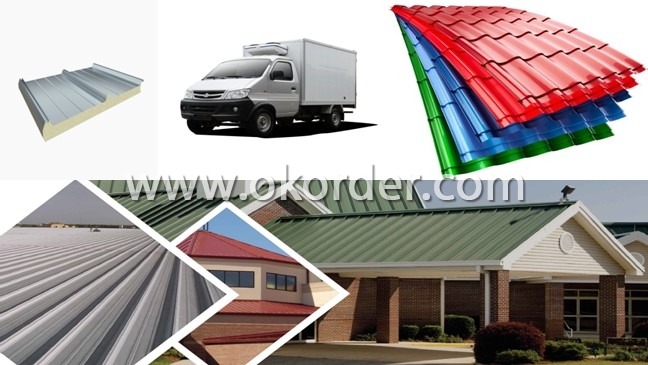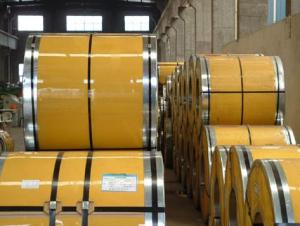Best Quality for Prepainted Aluzinc Steel Coil-RAL 3003
- Loading Port:
- China Main Port
- Payment Terms:
- T/T or L/C
- Min Order Qty:
- 25M/T m.t.
- Supply Capability:
- 10000 Metric Tons Per Month m.t./month
OKorder Service Pledge
OKorder Financial Service
You Might Also Like
General Information Of Prepainted Aluzinc Steel
With aluzinc as base metal, after pretreatment (degrease and chemical treatment) and liquid dope with several layers of color, then after firing and cooling, finally the plate steel is called pre-painted aluzinc steel. Pre-painted galvanized steel is good capable of decoration, molding, corrosion resistance. It generally displays superior workability, durability and weather resistance.
|
Thickness 0.23-1.2mm (BMT) |
|
Width 900-1250mm |
|
Alu-zinc Coating: 50-180g/m2 |
|
Internal Diameter 508mm or 610mm |
|
Color According to RAL color fan |
|
Coil Weight 4-8MT |
|
Quality Commercial and structural quality |
|
Paint Polyester paint for topside, epoxy for reverse |
|
Standard JIS G 3322, ASTM A755M, EN 10169 |
|
Base Steel Grade SGCC, SGCD, DX51D+Z DX52D+Z; S200GD, S220GD, S280GD,S350GD,CS,FS,SS |
Chemical Composition Of Prepainted Aluzinc Steel
|
C |
Si |
Mn |
P |
|
0.04-0.06% |
0.01-0.03% |
0.18-0.22% |
0.014-0.016% |
Technical Data Of Prepainted Aluzinc Steel
|
Yield Strength |
(Mpa) 280-320 |
|
Tensile Strength |
(Mpa) 340-390 |
|
Elongation |
20%-30% |
|
Reverse Impact |
9J |
|
T-bending |
≥2T |
|
Pencil Hardness |
≥2H |
|
Duration Of Salt Spray Test |
500 H |
|
Bending At 180 Degree |
No crack, purling and fraction |
Application Of Prepainted Aluzinc Steel
Outdoor:
roof, roof structure, surface sheet of balcony, frame of window, door, door of garage, roller shutter door, booth, Persian blinds, cabana, etc.
In door:
door, isolater, frame of door, light steel structure of house, home electronic appliances, etc.
Packaging & Delivery Of Prepainted Aluzinc Steel
Anti-damp paper inside full wrapped with plastic film, iron sheet outside on wooden pallet in 20 feet container with 25mt.


- Q:Will a 8mm steel ball fired from a 150lbs crossbow kill small game and if so, from how many yards?
- Steel Crossbow
- Q:Ik iron was too heavy but could steel bolts have been used. I can see iron dissolving at surface when to be a danger it needs to reach the core of sun.. But so does steel go deeper in(w.e alloy turned from iron)..I wanna know which would be worse iron..or upgraded iron(steel) and if the steel would have worse effects than normal iron..Im sure if we used iron we used steel
- Reach the core of the sun? No material can even get past the corona of the sun, where did you hear Ulysses went to the core? The spacecraft Ulysses orbits the sun at about 5 au. that's 5 times the earths orbit.. Steel is used instead of Iron because steel is much stronger and therefore you can use smaller 'bolts' to accomplish the same thing, reducing the weight. As far as most structures are concerned steel is better than plain Iron in every category. So Iron is worse i guess.
- Q:I know that the steel is significantly harder than when air cooled, but why is the quenched steel harder?
- When steel is slowly cooled, lots of carbon diffusion takes place because it is not very soluble in steel at room temperature. The carbon is in solution at high temperatures, and is rejected out of the lattice as it cools. And when this happens, the microstructure will consist of ferrite and pearlite, and the lattice structure will be base centered cubic (bcc). If it is cooled fast enough, then the carbon gets trapped in the interstitial sites of the lattice and distorts it to a body centered tetragonal (same as bcc, but elongated in one direction) This elongation strains the lattice and makes it harder. Also, when cooled fast enough the atoms do not have time to diffuse like they normally would and they shear into place. This forms the hard phase of martensite that is desired of heat treated steel. But then it must be tempered back some because it is too brittle.
- Q:What are the different grades of steel used for manufacturing coils?
- The different grades of steel used for manufacturing coils include low carbon steel, medium carbon steel, high carbon steel, and stainless steel.
- Q:I'm searching for the elastic modulus of ASTM A653 galvanized steel sheet. Max points for first person with a response that includes web address of reliable reference - I just haven't found it yet. thanks!
- Aluminum is non ferrous so a magnet won't persist with it, and this is softer than steel. once you have desperate that, if it has previous paint on it, this is particularly helpful to apply a primer that corresponds to the paint you would be utilising the two vinyl or oil based, then paint. this is possibly no longer Galvanized, yet whilst this is, the unpainted floor with have a 2 colour steel Spackle look.
- Q:How are steel coils used in the manufacturing of railway equipment?
- Steel coils are a crucial component in the manufacturing of railway equipment due to their strength, durability, and versatility. These coils are typically made from high-quality steel and are extensively used in various applications throughout the railway industry. One primary use of steel coils in the manufacturing of railway equipment is in the production of train tracks. Steel coils are rolled out and shaped into long, continuous rails that form the foundation of railway tracks. The strength and durability of these coils enable the tracks to withstand heavy loads, constant train traffic, and harsh weather conditions. Additionally, the uniformity and consistency of steel coils ensure smooth and safe train operations. Furthermore, steel coils are also used in the manufacturing of railway wagons and carriages. These coils are formed and shaped into various components such as the framework, body panels, and structural supports of the wagons. The robustness of steel coils ensures the structural integrity of the wagons, enabling them to carry heavy cargo and withstand the rigors of railway transportation. Moreover, steel coils are utilized in the fabrication of various railway equipment accessories, including couplings, brake systems, and suspension components. These coils are transformed into precise shapes and sizes to meet the specific requirements of each accessory. The strength and resilience of steel coils make them ideal for these critical parts, ensuring efficient and safe operation of the railway equipment. In summary, steel coils play a vital role in the manufacturing of railway equipment. Their strength, durability, and versatility make them an essential material for the construction of train tracks, wagons, carriages, and various accessories. The use of steel coils ensures the safety, reliability, and longevity of railway equipment, making them an integral part of the railway industry.
- Q:And by how much? I'm pretty sure that sterling silver is stronger, but I'm wondering if I could still use a metal stamp to stamp into something that's stainless steel - if it would be soft enough?
- Advantages of sterling silver: * This metal is quite easy for jewelry-makers to work with; therefore, it is simpler for them to create more intricate types of pieces with sterling silver. * The tarnish that can develop on sterling silver is well-liked by some people. Disadvantages of sterling silver: * The aforementioned tarnish is not so well-liked by other people; some people dislike how sterling silver looks as it ages. * Because this material is so soft, it is susceptible to dings, dents, and scratches. Advantages of stainless steel: * Stainless steel pieces will not oxidize or tarnish at all. * Many people find it to be shinier than sterling silver because it offers great light reflection when it is polished to look like chrome. * Stainless steel can also be brushed to look like pewter, too. * Stainless steel is extremely durable and will resist dents, scratches, and chips better than most any other jewelry material. * The cost of stainless steel is quite affordable - much more so than jewelry pieces made from other materials. Disadvantages of stainless steel: * People may know that you have not spent a lot of money on a piece of jewelry (this may or may not be an issue for some jewelry wearers).
- Q:How are steel coils used in the manufacturing of drivetrains?
- Steel coils are used in the manufacturing of drivetrains as they provide the necessary strength and durability required for various components such as gears, shafts, and bearings. These coils are often shaped and machined to create specific drivetrain parts that can withstand the high pressures and forces involved in transferring power from the engine to the wheels.
- Q:What does INOX Steel means?I have been looking up the meaning but cannot find it... please help...
- Inox steel is also called stainless steel. It's a metal which does not rust (stainless), almost :- ) It's strong, light, durable and often used in aero-plane industry. But you can find it back in the kitchen as well, most pan are made of INOX.
- Q:I'm talking about the sort of carbon fiber that's used in the auto industry (mostly in supercars).If an object made of steel were to be copied by an exact same object, but made of carbon fiber - how lighter would the carbon fiber object be?For example, if a table is made of steel and it weighs X, how much will it weigh if it were made of carbon fiber?Thanks.
- Carbon fiber doesn't really refer to a single material (steel doesn't either, but most steels have similar densities). Pure carbon fiber is just that, fibers made of 90+% carbon. Carbon fiber in the context of cars usually refers to carbon fiber-reinforced polymers rather than plain woven fibers. The polymer adds rigidity to what would otherwise just be like a sheet of fabric. The density depends on the polymer used and the ratio of polymer:fiber. For 50% fiber by volume in epoxy, it has a density of 1.6 g/cm^3. Steel has a density of ~7.8 g/cm^3. So, by volume, steel is almost 5 times heavier.
1. Manufacturer Overview |
|
|---|---|
| Location | Jiangsu, China |
| Year Established | 2003 |
| Annual Output Value | US$1 Million - US$2.5 Million |
| Main Markets | Southern Asia; America; South America; Eastern Europe |
| Company Certifications | ISO 9000 ISO 14000 OHSAS 18000 |
2. Manufacturer Certificates |
|
|---|---|
| a) Certification Name | |
| Range | |
| Reference | |
| Validity Period | |
3. Manufacturer Capability |
|
|---|---|
| a)Trade Capacity | |
| Nearest Port | Shanghai |
| Export Percentage | 1% - 10% |
| No.of Employees in Trade Department | 100 People |
| Language Spoken: | English; Chinese |
| b)Factory Information | |
| Factory Size: | Above 200,000 square meters |
| No. of Production Lines | 14 |
| Contract Manufacturing | Design Service Offered |
| Product Price Range | Average |
Send your message to us
Best Quality for Prepainted Aluzinc Steel Coil-RAL 3003
- Loading Port:
- China Main Port
- Payment Terms:
- T/T or L/C
- Min Order Qty:
- 25M/T m.t.
- Supply Capability:
- 10000 Metric Tons Per Month m.t./month
OKorder Service Pledge
OKorder Financial Service
Similar products
New products
Hot products
Related keywords





























